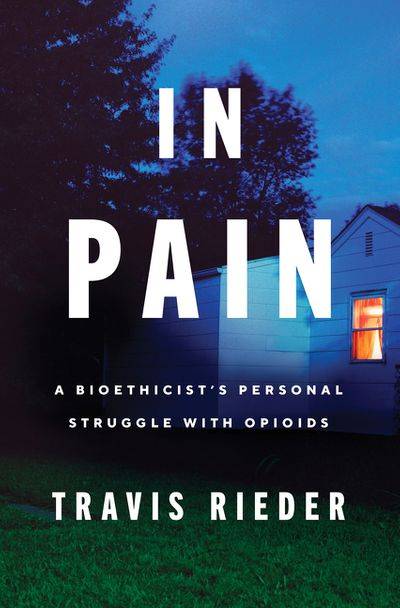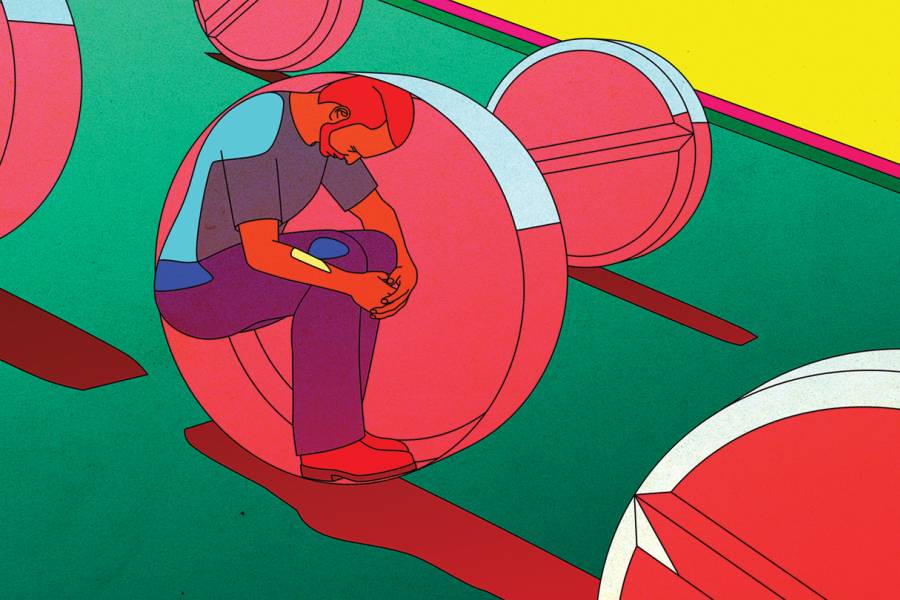On May 23, 2015, Travis Rieder jumped on his new motorcycle for a leisurely morning ride on the beautiful, winding roads of the Shenandoah Valley. Earlier that day, he had spent some quality time with his then 18-month-old daughter, Sinem. The two made breakfast together, played on the floor with toys, and watched cartoons—ever careful not to wake mom (his partner, Sadiye) who slept in on this sunny Saturday of Memorial Day weekend.
In Rieder's own words, it "started out as such a good day." Then, in an instant, Rieder's life went horribly sideways. Three blocks from his house, his bike collided with a van at an intersection. Like a slow-motion action scene, Rieder found himself midair for what he describes as an improbably long time, before landing on his back in the middle of the road. His motorcycle came crashing down on his leg. In addition to other injuries, his left foot suffered a compound fracture that left the extremity gruesomely mangled.

Image credit: HarperCollins
In the days, weeks, and years to come, Rieder underwent six operations, aided by pain medications that Rieder believes were both miraculous and essential to his recovery. But as he recuperated, Rieder would learn the physical and mental agony of opioid dependence. Rather than risk addiction, he opted to wean himself off the drugs, discovering that withdrawal caused an excruciating pain of its own. On his worst day, Rieder recalls having flu-like symptoms, shaking constantly, and experiencing an all-consuming nausea that found him on his bathroom floor.
"What I remember the most is this belief that I was broken beyond repair," says Rieder, a research scholar at the Johns Hopkins Berman Institute of Bioethics. "You could not have convinced me at that point I would ever get better. My brain was toast, my body completely shattered." The next day he followed his doctors' advice and committed to going back on the meds, despite the real fear he would never be able to come off them.
In his new book, In Pain: A Bioethicist's Personal Struggle with Opioids, Rieder combines this harrowing personal experience with an insightful look at America's complicated—and sometimes deadly—relationship with opioids. Rieder unpacks the history of the drugs, which were first invented in the 1800s, as well as the changing attitudes about pain management in the following decades. Along the way, he explores the science of addiction and the systemic and cultural barriers that must be overcome in order to address the problem effectively.
The book grew out of a 2017 essay Rieder published in Health Affairs titled "In Opioid Withdrawal, With No Help in Sight" and a TEDxMidAtlantic talk he gave later that year that today has over 2.1 million views. "At first I wasn't sure about a book. I didn't know if I could bring myself to publish my story, which was so intimate and personal, and involved details of my family," he says. "But, I thought, I have a podium here because I'm a faculty member at Johns Hopkins. I'm a bioethicist. I have the ears of people who can make a difference."
While his previous work dealt with the ethics of climate change, Rieder now focuses almost exclusively on issues related to pain and addiction, and finding a solution to America's opioid crisis, an epidemic that results in tens of thousands of deaths each year. Today, he receives a steady flow of emails and letters from those battling opioid addiction and chronic pain. "I collect tragedy," he says.
Ultimately, In Pain asks: How did we get here, and what can we do about it? He reveals that doctors who are quick to prescribe—and overprescribe—opioids aren't equipped with the tools to eventually get people off the meds. Rieder makes clear that when dealing with real, debilitating pain, anyone can fall victim to addiction, and not everybody is treated equally and fairly.
In this excerpt from In Pain, Rieder describes the psychological anguish that he experienced while withdrawing from the medication—and the importance that family played in his recovery.
Perhaps if my doctors had told me what to expect with opioid withdrawal, I could have intellectually prepared myself for what I had to do in order to resist. I could have reminded myself that I knew why this was happening and that I would get through it. But I had no preparation, and no help, so I let the darkness steer me. I thought that I had special insight into just how damaged I was, and the answer was: severely damaged. Too far gone to be salvaged. A good portion of each day, then, was spent sobbing and wondering what I would do if this was my new life. For a while at least, the darkness was intermittent; after crying for a bit, I would start to pull through it, and especially when Sadiye was there to talk to me, I could start to right the ship of my emotions. But as the days wore on, the darkness came more often and stayed longer, putting more and more pressure on Sadiye to be there to pull me out of a tailspin.

Image caption: Travis Rieder
Image credit: Courtesy of Travis Rieder
[By week three of my opioid taper, my] life had settled into a very tight, very hard, very stressful pattern. Sadiye would spend time with me in the morning (indeed, she often woke up in the middle of the night to come check on me, and to see if I was sleeping at all). Then she would leave for work, dropping Sinem off at day care, and I would try to make it through the morning without a depressive episode. I knew that if I could make it until close to noon, she would come back home during her lunch break, and I focused on that whenever the morning got hard. One of the local health clubs had a therapy pool, and we had discovered that floating in its warm waters could help ease my symptoms. Although getting to the pool, changing, showering afterward, and getting home was an almost impossible amount of work, it was worth it in order to feel like I might survive. And because she's clearly a saint, my superhero partner found it worth the effort in order to be doing something that really helped. So she would dart home; help get me out the door, down the stairs, and into the car; get me out of the car and into the gym; help me into the pool (which, designed for handicapped individuals, was fortunately easier than it might have been); tiredly watch me float for an hour or so; get me out of the water and into the shower; help me get dressed; and then take me back home to the couch again, before going straight back to work. Every day, she gave me something to look forward to, and often that would be enough to get me through the morning.
The afternoons were harder. They seemed to stretch on much longer, and I quickly got to the point where I rarely made it through an afternoon without breaking down in tears. I'd always know it was coming, and I tried to fight it. The game was distraction and a desperate hope for real rest. If I could keep my brain occupied—or, even better, if I could get in a nap—I could sometimes make it through the afternoon without a call to Sadiye to talk me down from whatever mental precipice I found myself on that day.
My beautiful, wonderful baby daughter gets left out of a lot of this story, and that's really part of the pain; I simply wasn't present, so I barely remember her being there at all. I know that Sadiye was somehow managing to handle childcare while also caring for me and running the house. And I vaguely remember Sinem occasionally crawling on me on the couch while Sadiye sat apprehensively on the ottoman just inches away, watching so that she could jump up and grab her if she got too close to my foot or the surgical site on my thigh. But most of what I remember is solitude and pain.
I do, however, remember one particular day, as it changed my view of what my one-and-a-half- year-old daughter was capable of. I had made it the whole day through late afternoon without crying, and without the depression crashing in. I had dared to hope that this might mean I was turning a corner and that maybe I was going to get some of my life back. And then, around four or five o'clock, I felt the telltale welling in my chest and the darkness circling. The feeling immediately caused panic, and then despair. Sadiye picked up on the first ring, and I blurted out through sobs, "I almost made it today. Oh God, I'm so sorry. I'm so sorry I had to call you. I started to think I could survive this. But I can't. This will never get better. I'm so broken, baby . . . I'm just so broken. How can a body possibly recover from this?"
She was already driving home. "You will survive this," she said. "Your hormones and your brain, they're betraying you. But it will get better. Now just hold on. I'm about to pick up Baby Girl, and then we'll be home to take care of you." I said okay and hung up.
When the car pulled up outside the front window, right behind my spot on the couch, I tried to stop crying, as I always did my best not to let Sinem see me like that. But it was no use. The harder I tried, the more explosive the sobs became, and I eventually just gave up.
Sinem tends to enter the house like a freight train, and this day was no exception. When the door opened, she burst into the living room, singing at the top of her lungs. Until she saw me. She stopped babbling midsound and midstep, and her face turned serious. As she slowly walked over to where I was lying on the couch, I just cried to her. "I'm so sorry, Baby Girl. Oh God, I'm so sorry. I hope you won't remember this."
Also see
She didn't seem upset, though. She seemed in control. I was lying on my side on the couch, and so I was about eye level with her. She walked until her face was inches from mine, examining me intently with the deep, dark brown eyes that she got from her mom, and she asked, "Baba crying?"
"Yes, Baba crying," I told her. "Baba hurts, but it will be okay." I didn't believe it, but I was trying my best to be strong for my daughter.
And then she did something that I didn't understand and will never forget. She put her tiny little hands on my cheeks and held my face firmly while she looked directly at me. And then she kissed my eyes, one at a time. I had never seen her do anything like that before, and I could hardly believe it. Maybe she had learned that at day care; maybe Miss Mary or one of her helpers had kissed her eyes after she fell down one time. Or maybe it was just an incredible, empathetic intuition by my little girl. Whatever the explanation, I grabbed her and hugged her as tightly as I ever have, and I told her that she had just helped Daddy get through one more night.
Excerpted from In Pain: A Bioethicist's Personal Struggle With Opioids.
Posted in Health, Voices+Opinion










